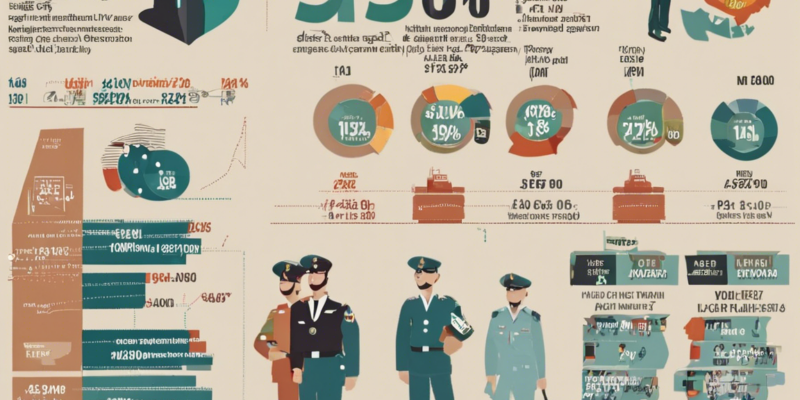Introduction
In recent years, a significant aspect of the recruitment and retention strategies for government positions, particularly in law enforcement, has been the discussion around the Indian Police Service (IPS) salary structure. The IPS is one of the most prestigious civil services in India, with officers playing a crucial role in maintaining law and order in the country. However, concerns have been raised regarding the adequacy of the salary provided to IPS officers in comparison to the challenging and often high-risk nature of their job. This article will delve into the impact of IPS salary on recruitment and retention within the service, exploring the various factors at play and potential solutions to address the issues.
Current Scenario of IPS Salary
The IPS salary structure is determined by the recommendations of the Seventh Pay Commission, which sets the pay scales for government employees in India. At present, the basic pay of an entry-level IPS officer is Rs. 56,100 per month, with various allowances and benefits adding to this amount. As officers progress in their career, they are entitled to higher pay scales based on their rank and years of service. While the salary of IPS officers may seem lucrative to some, it is essential to consider the demanding nature of their job, which often involves working long hours, handling high-pressure situations, and risking their lives in the line of duty.
Impact on Recruitment
The salary structure of IPS officers plays a crucial role in attracting top talent to the service. The recruitment process for the IPS is highly competitive, with thousands of candidates appearing for the civil services examination every year. However, concerns have been raised about the dwindling interest in joining the IPS due to the perceived inadequacy of the salary offered. Many talented individuals, especially those with specialized skills and qualifications, are opting for alternate career paths in the private sector where the financial rewards are significantly higher.
Moreover, the long-term financial prospects within the IPS may also influence the decision of candidates during the recruitment process. While the pay scales for IPS officers increase with time and promotion, the gap between the salaries of public servants and their counterparts in the private sector widens considerably over the years. This disparity could deter potential candidates from choosing a career in the IPS, impacting the quality of the workforce and overall effectiveness of the service.
Challenges in Retention
Retention of experienced officers is another critical aspect influenced by the IPS salary structure. As officers gain experience and expertise in their field, they may seek better compensation and growth opportunities. The lack of competitive salaries and limited scope for earning additional income through promotions or special allowances can lead to disillusionment among senior IPS officers, prompting them to consider early retirement or lateral shifts to other government departments or the private sector.
The high attrition rate among IPS officers due to retirement, voluntary resignation, or transfers to other services can have a detrimental impact on the stability and effectiveness of law enforcement agencies. Losing experienced officers not only results in a loss of institutional knowledge and expertise but also hampers the leadership and morale within the service. Addressing the salary concerns of IPS officers is essential for improving retention rates and ensuring a skilled and motivated workforce in the long run.
Strategies for Addressing the Issue
To enhance recruitment and retention within the IPS, it is crucial to reassess the salary structure and associated benefits provided to officers. Here are some strategies that can be considered to address the issue:
1. Salary Revision: Conduct a comprehensive review of the current pay scales for IPS officers to align them with industry standards and the level of risk and responsibility associated with the job. Providing competitive salaries will not only attract top talent but also motivate existing officers to perform at their best.
2. Performance-Based Incentives: Introduce performance-based incentives or bonuses for IPS officers who excel in their duties or undertake challenging assignments. Recognizing and rewarding exceptional performance can boost morale and incentivize officers to strive for excellence.
3. Special Allowances: Apart from the basic pay, consider providing special allowances for officers posted in difficult or high-risk areas. Hazardous duty pay, hardship allowances, and other incentives can acknowledge the sacrifices made by officers in challenging environments.
4. Career Progression: Enhance career progression opportunities within the IPS to ensure that officers have a clear pathway for growth and advancement. Regular training, skill development programs, and opportunities for specialized assignments can keep officers engaged and motivated to stay in the service.
5. Pension and Retirement Benefits: Strengthen the pension and retirement benefits offered to IPS officers to provide financial security post-retirement. A robust pension scheme and adequate healthcare benefits can alleviate concerns about future financial stability and incentivize officers to continue serving until their superannuation.
Conclusion
The salary structure of IPS officers has a direct impact on recruitment and retention within the service, influencing the quality of the workforce and the effectiveness of law enforcement agencies. Addressing the salary concerns of IPS officers is essential to attract top talent, retain experienced officers, and ensure a motivated and skilled workforce dedicated to upholding law and order in the country. By reassessing the current pay scales, introducing performance-based incentives, enhancing career progression opportunities, and strengthening retirement benefits, the government can create a conducive environment for IPS officers to thrive and contribute effectively to the service.
FAQs
Q1. Are IPS officers well-compensated for their services?
A1. While the basic pay of IPS officers is competitive, there are concerns about the overall adequacy of their salary structure considering the demanding and high-risk nature of their job.
Q2. How does the salary of IPS officers compare to private sector jobs?
A2. The salary of IPS officers, especially at the senior levels, is relatively lower compared to private sector jobs with similar levels of responsibility and experience.
Q3. What are some challenges faced by IPS officers due to the current salary structure?
A3. Challenges include attracting top talent during recruitment, retaining experienced officers, and maintaining morale and motivation within the service.
Q4. How can performance-based incentives benefit IPS officers?
A4. Performance-based incentives can motivate officers to excel in their duties, boost morale, and provide additional rewards for exceptional performance.
Q5. What role does career progression play in retaining IPS officers?
A5. Career progression opportunities are essential for keeping officers engaged and motivated, providing a clear pathway for growth and advancement within the service.









